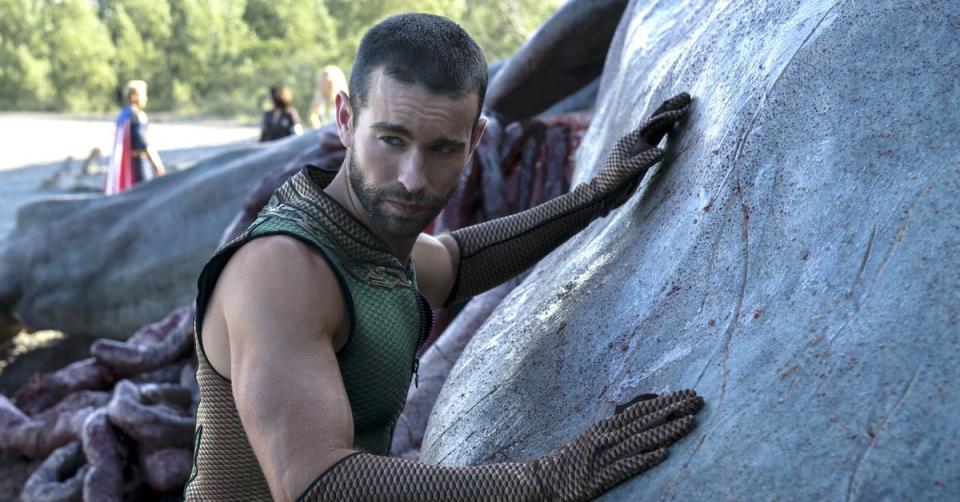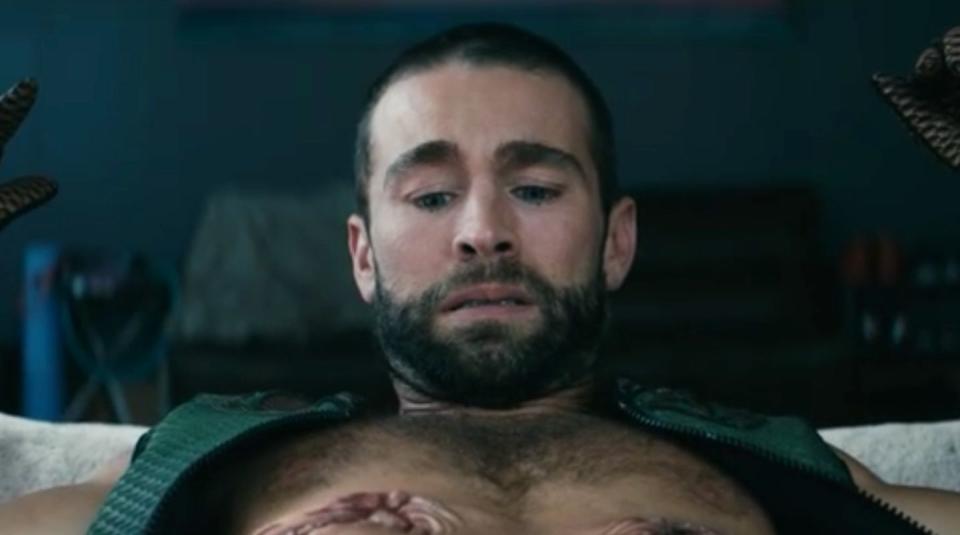The Boys season 2 creates a much-needed conversation around body dysmorphia

The Boys season 2 episode 1-4 spoilers follow.
Ultron was pretty tough and Thanos wiped out billions in the blink of an eye, but the real scourge of the Marvel Universe is clothing. And that's especially true when it comes to the male Avengers.
Despite all their vaunted strength, it seems that super soldiers and Norse gods alike are still vulnerable to good old-fashioned cotton, choosing to flaunt and flex their naked torsos at any given opportunity. I mean, does Captain America even need a shield when he can whack out those pecs of steel out at a moments notice?
Probably not. Are we gonna complain about it though? Actually, yes. As much as we might enjoy seeing the effects of the super-soldier serum up close, objectifying these Adonis-like figures on screen can have an adverse effect on men watching at home.

That's long been true for women as well, but in a world where the MCU reigns supreme, a fixation on the male physique in particular has helped create a new 'ideal body' for men which is more unattainable than ever.
In 2015, the BBC reported that 10% of men in gyms suffer from muscle dysmorphia, a condition which revolves around obsessive muscle gain and the desire to reach a "perfect" shape promoted by the media. Even the actors who play these heroes are vulnerable to what's otherwise become known as "bigorexia".
Eternals star Kumail Nanjiani admitted to Men's Health earlier this year that training to become a superhero created some feelings of body dysmorphia. Our new Batman, Robert Pattinson, is also prone to these issues, revealing back in 2013 that he's previously suffered from body dysmorphia and "overall tremendous anxiety".
A post shared by Kumail Nanjiani (@kumailn) on Dec 16, 2019 at 8:10am PST
"I suppose it's because of these tremendous insecurities that I never found a way to become egotistical," he added. "I don't have a six-pack and I hate going to the gym. I've been like that my whole life. I never want to take my shirt off."
Patients diagnosed with muscle dysmorphia often experience physical problems, too, which co-exist along with these kind of anxieties and psychological issues. Health risks can include heart disease and kidney failure, as well as more common instances of substance abuse.
So, what does The Boys have to do with all this? Well, on the face of it, The Deep's open vest and tight spandex is in line with what we'd expect male superheroes to wear in 2020, even if he doesn't strip off as much as his DC counterpart, the eternally topless Aquaman.

However, even with his chiseled physique and that superhuman jawline, it turns out Chace Crawford's character still battles deep-rooted issues regarding his body, and these finally rose to the surface in season two.
While tripping on mushrooms, The Deep hallucinates that his gills have come to life, enabling him to physically confront his self-loathing head-on. "You imagine women will laugh at us, so you humiliate them first," the gills point out, before they end up singing Joe Cocker's 'You Are So Beautiful' together with The Deep.
During an exclusive interview with Digital Spy, showrunner Eric Kripke told us that this scene came about because of one vital question: "Why does The Deep take out so much of his aggression on women? The answer is because he hates himself, and he thinks he's a freak, and he thinks he's a freak primarily because of those gills."

While none of this justifies The Deep's abhorrent treatment of women, including multiple counts of violence and sexual assault, this scene does illustrate the harm that body dysmorphia can cause, even if it's in the form of these absurd talking gills.
Episode four goes on to explore how these pressures impact women too, albeit in a far more subtle way. During a brief stop at a diner, Mother's Milk jokes that Starlight and her donut should "get a room" because of the joy she's taking out of every bite. Annie laughs this off, explaining that her mother never let her eat treats like this as a kid. It's a small moment, one that's easy to overlook, but it's also a rather telling one too.
At the start of season two, Starlight and the rest of the world discovered that the Vought corporation paid parents to give their children compound V, creating an entire generation of superheroes they could control. Annie's mother agreed to these terms, but it wasn't just for the money. By her own admission, Starlight became a trophy that her mother could show off, so it's no wonder that eating sugary treats was a "capital punishment" in their house.
To create the perfect superhero, Annie's mother felt it necessary to limit her child's diet, which in turn impacted Annie's own relationship with food. This is touched on again later in the same episode when Starlight gets excited to try different chocolate bars out of the vending machine. As she moves further away from the "ideal" superhero life Vought planned out for her, Annie is able to finally start eating what she wants without feeling the pressure to maintain a "perfect" body.
Much has changed since Adam West rocked an attainable physique in the '60s Batman TV show. Even in the early 2000s, male and female superheroes alike sported vaguely realistic body types, but that all changed in the wake of the MCU's first phase. While they're not solely responsible for the increasingly homogenised superheroes who now appear on screen, it's fair to say that Marvel's multi-billion dollar success has certainly encouraged other studios to follow suit.
Of course, superheroes should look super, that's the whole point – but this can be a problem when superhero stories universally fail to acknowledge how difficult it is to attain these bodies. That's true of both the films and the comics that inspire them too.

The Boys has always poked fun at Marvel and DC heroes, but by diving deep into the absurdities of this genre, season two in particular has started the kind of vital conversations around body image we sorely need. After all, most of us are never going to look like super soldiers or Norse gods, and that's okay.
It's only by talking about body dysmorphia and confronting the realities of this industry that we can start to encourage men and women alike to prioritise health over aesthetics. If not, we could end up in a world where the superheroes we admire do more harm than good to both our self-esteem and overall wellbeing.
We would encourage anyone who identifies with the topics raised in this article to reach out. Organisations who can offer support include NHS Choices (www.nhs.uk), MIND on 0300 123 3393 (www.mind.org.uk) and The Body Dysmorphic Disorder Foundation (www.bddfoundation.org).
The Boys season two dropped on Amazon Prime Video on September 4 with episodes 1-3, and will continue weekly from September 11.
Digital Spy has launched its first-ever digital magazine with exclusive features, interviews, and videos. Access this edition with a 1-month free trial, only on Apple News+.
Interested in Digital Spy's weekly newsletter? Sign up to get it sent straight to your inbox.
You Might Also Like

